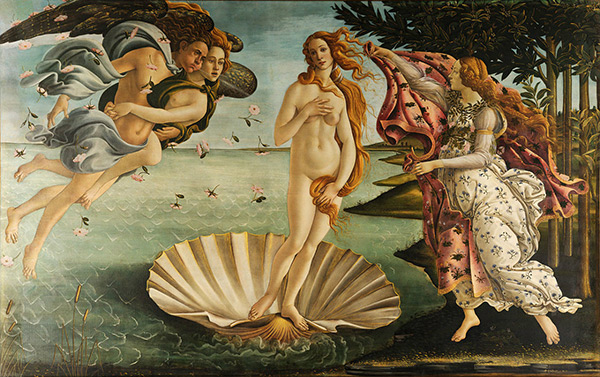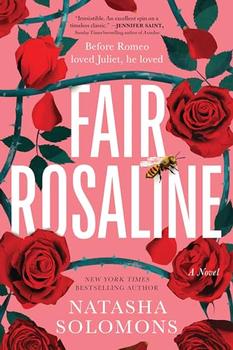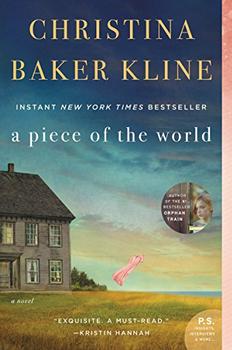Summary | Excerpt | Reading Guide | Reviews | Beyond the book | Read-Alikes | Genres & Themes | Author Bio

A Story of Botticelli
by Alyssa PalomboBorn in Genoa in 1453, Simonetta Cattaneo became known as "The Most Beautiful Woman in Florence" when she entered Florentine society at the tender age of 16. The new bride of Marco Vespucci, an intimate of the ruling Medici family (see 'Beyond the Book'), Simonetta was introduced to poets and painters alike, including Sandro Botticelli, a young artist just beginning to make a name for himself. It is Simonetta and how she came to pose for Botticelli's masterpiece, The Birth of Venus, that are at the heart of Alyssa Palombo's novel, The Most Beautiful Woman in Florence.

Although not much is known about the real-life Simonetta beyond the basic details of her life such as birth, death, and marriage, Palombo has sculpted a beautifully detailed work of historical fiction. Simonetta becomes a living, breathing presence as the novel vividly recreates her life. She grows from child to muse in just a few short years, and her attitudes on marriage and a woman's place in it grow and mature realistically.
Palombo seamlessly inserts tiny details about the life of a noblewoman in 15th century Italy, many aspects of which may be unknown to her audience. Simonetta, for example, talks in one place about her first dinner in Florence where she was introduced to a "curious, pronged implement that was all the rage among Florence's well-to-do set" – the fork. In another, she mentions that when they sat outside they would wear "wide-brimmed hats to shield our faces from the sun, yet with the crowns cut out so that our hair could be pulled through and left to fall down our backs, that it might lighten to a dazzling shade of gold." These details are minor, but will appeal to avid fans of historical fiction, because the book informs as well as entertains.
The author's descriptions of the streets and buildings of Florence, many of which still stand today, are another highlight. Readers travel through the marketplaces and down the cobblestone streets to Botticelli's workplace, as well as to the magnificent Medici Palazzo and several cathedrals such as the Santa Maria del Fiore topped by Brunelleschi's dome, an architectural marvel.
The entire structure was enormous, not just the great dome. Up close I was able to admire the intricate marble detailing on the outside, completed in not only white stone but also in strips and blocks of green and pink. Tall, narrow windows were set into the sides, framed with the elaborately carved stonework. Beside the cathedral stood its campanile, nearly as tall as the dome, built in the same multicolored stone as the cathedral itself. The bells rang an urgent yet melodious toll, calling worshippers to mass.
 Although I felt as if I were on a tour of Florence at times, the city comes across as the metropolis of today and not the Renaissance. Despite the author's exceptional ability to describe what her heroine would have been seeing and experiencing, I somehow never got the sense of time. One of the reasons is that the characters often seemed too modern. After Simonetta's wedding night, for example, a friend asks her, "How did it go?" I'm not a linguist, but I feel that phrase, and many others, seem too idiomatic to 20th century America as opposed to the era being captured in the novel. There were other times when the dialog seemed straight out of Jane Austen's 18th century England and not 15th century Italy (lots of "indeed!" and "how so?" are interjected, for example). And finally, as Simonetta is introduced to others, the very first words from every single individual she meets is praise for her beauty. It not only seemed implausible, but got tiresome after the first few times.
Although I felt as if I were on a tour of Florence at times, the city comes across as the metropolis of today and not the Renaissance. Despite the author's exceptional ability to describe what her heroine would have been seeing and experiencing, I somehow never got the sense of time. One of the reasons is that the characters often seemed too modern. After Simonetta's wedding night, for example, a friend asks her, "How did it go?" I'm not a linguist, but I feel that phrase, and many others, seem too idiomatic to 20th century America as opposed to the era being captured in the novel. There were other times when the dialog seemed straight out of Jane Austen's 18th century England and not 15th century Italy (lots of "indeed!" and "how so?" are interjected, for example). And finally, as Simonetta is introduced to others, the very first words from every single individual she meets is praise for her beauty. It not only seemed implausible, but got tiresome after the first few times.
Readers should be advised that the book can safely be shelved in the "Romance" section of their local bookstore. In real life Botticelli asked to be buried at Simonetta's feet when he died—his wish was granted. Palombo uses this incident to speculate not only that the artist loved his subject, but that a passionate affair developed between the two. Much of the book involves Simonetta's growing fascination with Botticelli as she becomes disillusioned with married life; there are many scenes describing smoldering looks, accidental contact and verbal foreplay between the two. While well done, it may be more overtly romantic than some would prefer in a historical fiction novel. In addition, the book does contain several rather graphic sexual scenes; they're not Fifty Shades of Gray, but probably more detailed than some readers would be comfortable with.
Regardless, The Most Beautiful Woman in Florence will likely be very satisfying for most historical fiction fans, particularly those interested in Renaissance Italy and novels that revolve around great works of art. Palombo's attention to detail and her ability to bring Simonetta to life make the book well worth any reader's time.
Picture of The Birth of Venus painting from Uffizi
Picture of Brunelleschi's dome by Florian Hirzinger
![]() This review
first ran in the May 31, 2017
issue of BookBrowse Recommends.
This review
first ran in the May 31, 2017
issue of BookBrowse Recommends.

If you liked The Most Beautiful Woman in Florence, try these:

by Natasha Solomons
Published 2024
The most exciting historical retelling of 2023: a subversive, powerful untelling of Romeo and Juliet by New York Times bestselling author Natasha Solomons.
Was the greatest ever love story a lie?

by Christina Baker Kline
Published 2018
From the #1 New York Times bestselling author of the smash hit Orphan Train, a stunning and atmospheric novel of friendship, passion, and art, inspired by Andrew Wyeth's mysterious and iconic painting Christina's World.
Your guide toexceptional books
BookBrowse seeks out and recommends the best in contemporary fiction and nonfiction—books that not only engage and entertain but also deepen our understanding of ourselves and the world around us.